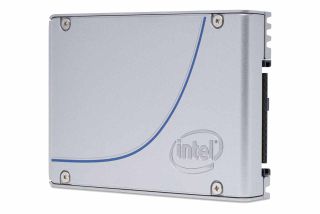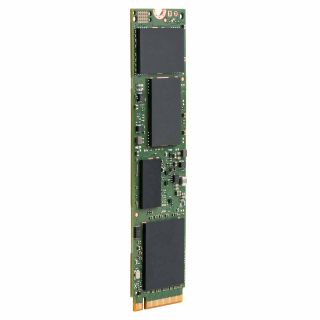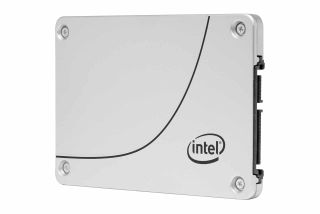Intel Refreshes Portfolio With 3D NAND SSDs

Intel announced that it's refreshing its consumer, data center and IoT SSDs with six new SSDs armed with its new IMFT 3D NAND. The move marks Intel's first products with its much-anticipated 3D IMFT NAND.
Intel and Micron have produced NAND jointly through the IMFT (Intel/Micron Flash Technologies) JV for the better part of a decade, but the benefits of membership don’t provide Intel with automatic access to Micron's flash. The IMFT agreement requires both parties to invest in R&D of each new generation of NAND, but Intel chose to skip the 16nm investment, instead relying on the IMFT 3D NAND as the path forward.
Unfortunately, IMFT 3D NAND took a bit longer than anticipated to reach the market, which left Intel on the outside looking in for an entire generation of planar NAND. This forced Intel to move to SK hynix 16nm NAND for many of its newest products, but the new source doesn't provide it with the low-cost flash that it enjoyed with its own stock of jointly manufactured NAND.
Although IMFT is a partnership, Micron traditionally shouldered the manufacturing load. Intel recently announced that it is opening its own 3D line in its Dalian fab, which changes the dynamic somewhat, but for now, the IMFT 3D NAND flowing into Intel's new SSDs springs from the IMFT fabs. In either case, Intel regains the price inefficiencies of its own captive NAND supply, which should help it lower costs to stave off the surging Samsung.
Intel SSD Pro 600p, 6000p And E 6000p Series
The 600p slots into the normal consumer market, and Intel designed the 6000p for business notebooks and desktops. Both SSDs feature a PCIe 3.0 x4 connection and leverage the NVMe protocol.


The 600p kicks off Intel's 3D NAND party with four capacities that span from 128 to 1,024 GB in a single-sided M.2 form factor. The SSDs feature the economical 3D TLC NAND in tandem with a PCIe 3.0 x4 NVMe connection. The diminutive SSDs provide up to 1,800/560 MB/s of sequential read/write throughput and 155,000/128,000 random read/write IOPS.
The 600p comes with a five-year warranty and supports AES 256 encryption. Intel is light on technical details for the moment, so we aren't sure which controller it is using, but it's likely continuing to use the SMI controllers. The 600p targets the value market with a $359 MSRP for the 1 TB model.
Stay On the Cutting Edge: Get the Tom's Hardware Newsletter
Get Tom's Hardware's best news and in-depth reviews, straight to your inbox.

Intel geared the 6000p to the business segment via specific features such as remote secure erase capabilities. It comes in the single-sided M.2 form factor and features sequential transfer speeds up to 1,800/560 MBps read/write, and up to 155,000/128,000 random read/write IOPS. Intel designed the SSDs with low power in mind, but it did not list the endurance specifications.

The E 6000p series features sequential transfer speeds up to 1,570/540 MBps read/write IOPS and up to 71,000/112,000 random read/write IOPS with the 256 GB capacity. The smaller 128 GB model features a reduced level of performance, and it is notable that both capacities have higher random write specifications than read, which leads me to believe Intel either inadvertently swapped the specifications, or that the company made some design tradeoffs to tailor the SSD for the embedded space.
The SSD targets the embedded space with an NVMe interface, which is still relatively rare in the cost-conscious segment. It will likely find use in more advanced IoT products.
Datacenter P3520, E 5420S and S3520

The P3520 targets the value-centric datacenter NVMe PCIe market, so we shouldn't expect bleeding-edge performance. The majority of sales are in the cost-conscious segment, especially as users deploy SSDs into more mundane workloads, so it's a sound strategy to lead with this caliber of product.

The DC P3520S comes in capacities of up to 2 TB and features up to 375,000/20,000 random read/write IOPS and 1,700/1,350 MBps of sequential read/write throughput. Intel built the DC P3520 on the same architectural platform as its DC P3X00 series predecessors, but Intel changed the NAND from 20nm IMFT to 3D MLC. We have much more coverage of this series here, but the real news is the low price point, which ranges from $294.00 to $948.00 (450 GB and 1.2 TB, respectively).



The DC S3520 is geared for the read-centric SATA segment of the data center, which is another high-volume unit mover. The new SSD comes in both 2.5" and M.2 form factors in a wide variety of capacity points. Intel lists the MTBF at 230 years, but don't expect that in normal use; it provides only a 1 DWPD (Drive Writes Per Day) endurance rating over a five-year warranty period. The top-end specs weigh in at 67,500/17,000 read/write IOPS and 450/380 MBps of sequential read/write throughput for the 2.5" variants.
The E 5420S is another product targeted at the embedded market, but it comes in both 2.5" and M.2 form factors. All of Intel's new 3D NAND SSDs are available now.

Paul Alcorn is the Managing Editor: News and Emerging Tech for Tom's Hardware US. He also writes news and reviews on CPUs, storage, and enterprise hardware.
-
TMRichard I'm sorry but I'm getting more and more unimpressed with all these new SSDs these days, no one (apart from Samsung) seems to be pushing the limits of SSD capacity, how many good performing M.2 or 2.5" SSD that are 1.5TB or larger are out there? not many other than the Samsung 2 and 4TB drives... We've had 1TB SSDs for over 3 years now, time to crack 2TB+ drives soon maybe? I keep hearing about all these high density dies that are being made but nothing seems to ever come of them...Reply
I'm ready to move entirely to flash but apparently no-one other than Samsung wants to take my money... I have 3x 3TB Mechanical drives that I'd love to change to equivalent or bigger sized SSDs. They don't need to be super fast as they are in a RAID but I'm not prepared to pay $2000NZD per drive, give me $500-650NZD 3-4TB drives and I'll snap them up.
TL;DR, no new high capacity consumer SSDs have hit the market from many people. Gimmie mah damn 3-4TB SSDs already! -
Brian_R170 I just went to Newegg. Am I imagining things, or are these crazy cheap?Reply
512GB $190
256GB $105
128GB $70
Isn't that about 40% lower than Samsung 950 Pro prices? -
Brian_R170 Oh, wait, it doesn't look like the 600p drives are really in the same performance category as the Samsung 950 Pro or Intel 750 series. Wonder how good they will perform in terms of performance per $.Reply -
Bruce427 Your are correct. The Intel 600P series is not even close to the performance of the Samsung NVMe offerings.Reply
Most Popular


